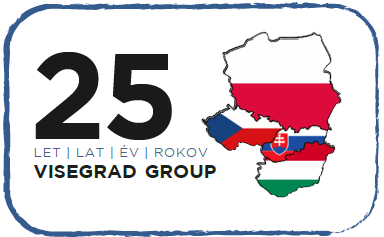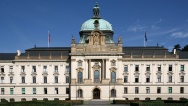Press Advisories
12. 2. 2016 18:08
25th anniversary of the foundation of the Visegrad Group
Statement by Prime Minister Bohuslav Sobotka on the 25th anniversary of the Visegrad Group
The Visegrad Group was spawned not long after our countries extricated themselves from the clutches of the Iron Curtain. Against this backdrop, the Visegrad Declaration was a manifestation of our countries’ clear resolve to integrate themselves into Euro-Atlantic structures, to play an active role in the European integration project, and to cooperate in the development of a society grounded in democratic values.
When the Czech Republic, Poland, Hungary and Slovakia acceded to the European Union, the divisions of Europe were healed for good. The trail we have blazed in the past 25 years, negotiating reforms, the establishment of democratic institutions and the advancement of civil society on the way, has been a great success story for our countries and for the idea of Europe. The Visegrad region exemplifies the success of European integration as a project putting universal human values and democratic ideals into action, consolidating stability and taking forward rapprochement within the European family of nations on the path to prosperity and social progress. We find it encouraging that we Visegrad countries are not merely onlookers in this process, but that we actively contribute to the formation and compounding of European cooperation.
European Union is facing a number of challenges. If we are to pull through, we must come up with joint European responses to them. We, the countries of the Visegrad Group, need a strong and agile European Union, and Europe needs a strong and active Visegrad Group.
With this in mind, my wish is for abundant success in the next quarter-century of Visegrad cooperation.
Bohuslav Sobotka, Prime Minister of the Czech Republic
The Visegrad Group
The Visegrad Group (also known as the Visegrad collaboration or V4) represents a form of regional collaboration involving the Czech Republic, Poland, Hungary and Slovakia. Its main objective is close collaboration between these countries and strengthening of stability in the Central European region. It has progressively become the most high-profile initiative in the region and a respected grouping on the international scene.
A History of the V4
The Group originally came about as the Visegrad Three with the signing of the “Declaration between the Czech and Slovak Federal Republic, Poland and Hungary on the road to European integration” on 15 February 1991 in Visegrad in Hungary. The signatories were Václav Havel, President of the CSFR, Lech Walęsa, President of Poland, and József Antal, Prime Minister of Hungary.
Following the collapse of the communist bloc, the representatives of these countries were facing similar problems, and agree therefore on a common approach to dealing with them. The main factors in the establishment of the Visegrad collaboration were in particular:
- the effort to eliminate the remains of the communist bloc in Central Europe
- the effort to overcome historical animosities between the countries of Central Europe
- a conviction that by joint efforts it would be easier to achieve its declared objectives, that is, to successfully implement social transformation and become involved in European integration.
An important part was played by the Visegrad Group in negotiations on NATO and EU membership. Accession by all of the V4 countries to the North Atlantic Alliance and the European Union (1 May 2004) was the fulfilment of the 1991 Declaration. During the Czech Presidency in 2003 – 2004 there was therefore a further focussing of collaboration, embodied in a new declaration adopted in Kroměříž in 2004, reflecting the new situation and outlining briefly in a number of theses the areas for Visegrad collaboration and the mechanisms for this. The Group focused on the development of Central European regional collaboration, for example in culture, education, the strengthening of civic society, the development of transport infrastructure and environmental protection, coordination of positions within the EU, support for countries preparing for EU entry and support for transatlantic collaboration as part of their membership of NATO.
Visegrad collaboration is not institutionalised and works mainly on the principle of regular meetings between its representatives (Presidents, Prime Ministers and Ministers, etc.). The four V4 countries rotate the Presidency of the Group at annual intervals, with the main coordinators of collaboration being the Ministries of Foreign Affairs. In June each year there is an official summit meeting of Prime Ministers, at which the Presidency is transferred. During each Presidency over the last few years there have been one or more unofficial Prime Ministerial summits.
The International Visegrad Fund
The International Visegrad Fund was established in 2000 with the objective of supporting closer collaboration between the V4 countries and contributing to strengthening ties between people in the region. It provides funding for joint cultural, scientific, research and educational projects, student exchange visits, tourism growth and cross-border collaboration. Since its instigation it has supported over 4,500 subsidised projects with a total value of cca. 62 million EUR. The Fund manages annually roughly eight million EUR, that is a contribution of two million EUR from each country.
Presidency of the Czech Republic
On 1 July 2015 the Czech Republic took over the Presidency of the Visegrad Group from Slovakia. This is now the sixth Presidency of an independent Czech Republic since the establishment of the V4.
The motto of the Czech Presidency is “ V4 Trust”, expressing the fact that the basis for the success of Visegrad collaboration is indeed mutual trust between the countries of the V4. The main priorities of the Presidency include for example collaboration on energy, the Eastern Partnership project, defence cooperation and the development of the digital economy. Further important topics are the development of transport infrastructure, the social dimension of European integration and the fight against tax avoidance.
As part of its Presidency the Czech Republic is also coordinating meetings of the V4 countries before the European Council meeting in Brussels and other summit meetings of EU leaders.
Since the start of its current Presidency the Czech Republic has already organised three Prime Minister summit meetings. The first took place at the beginning of September 2015 as an extraordinary Prime Ministerial meeting dealing with the development and impact of the migration crisis in Europe. The second was organised by the Czech Republic in December 2015. The President of the Republic of Korea Pak Kun-hje was invited to this as a guest. A further extraordinary summit will take place on 15 February 2016. The main topic will be the migration crisis. On that date the Prime Ministers of the Visegrad Group countries will commemorate the 25th anniversary of the founding of the V4.







